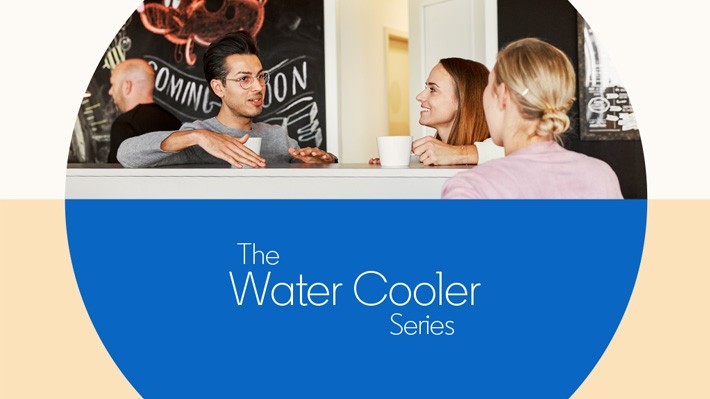Trends, tips, and best practices
How the last month has changed content engagement on LinkedIn
Every month, we publish our virtual watercooler analysis of the posts on LinkedIn that drive most shares across different regions. For the month of March, that sharing looks very different.
The COVID-19 pandemic now dominates content and conversation in every region in our analysis: Europe, Latin America, The Middle East and North Africa, and Sub-Saharan Africa. This is a sweeping change from just a week or so earlier. In February, posts mentioning coronavirus represented just 7.5% of the most shared posts in these regions. Since then, the watercooler conversations that we typically see around issues like gender equality, sustainability and innovation have been replaced by a single, overriding global concern.
It’s not just the subject matter that is changing, though. The crisis is also having a significant influence on the sources, formats and types of content that professionals turn to. Across our regions, we can see five dramatic trends in the nature of content engagement on LinkedIn:
- The amount of content sharing has increased dramatically, up more than 5x in Europe, doubling in Africa and growing by 76% in Latin America.
- In uncertain times, professionals are putting their trust in established news brands. In Europe in particular, broadsheet newspapers now dominate the list of the most shared posts.
- Audiences want to make sense of the situation through data. Models of the likely spread of coronavirus and the economic impact drive strong sharing in every region.
- Calls to action and activism are more influential than ever. Many of the most shared posts offer a mechanism for innovators, entrepreneurs or community organisers to get involved.
- There is greater overlap in the content that different regions are sharing. In a time of global crisis, credible insight and opinions resonate wherever they’re from.
These trends play out in subtly different ways in each region. Latin America balances global content with a continuing appetite for local perspective. Europe is starting to look towards the future social and economic consequences to a greater extent than other regions. Sub-Saharan Africa’s content sharing is influenced by ongoing experience of other devastating diseases. The watercooler for March is a reminder of the global nature of the challenge the world faces – but also of the different perspectives that regions bring to that challenge.
The Watercooler for Europe:
1. Coronavirus: Why You Must Act Now
From Thomas Pueyo on Medium
Published: March 10th
2. These simulations show how to flatten the coronavirus growth curve
From The Washington Post
Published: March 14th
3. Yuval Noah Harari: the world after coronavirus
From the Financial Times
Published: March 20th
From the European Commission
Published: March 13th
5. Sida: deuxième cas mondial de guérison complète
From Les Echos
Published: March 10th
6. Coronavirus: The Hammer and the Dance
From Thomas Pueyo on Medium
Published: March 19th
7. IR35 reforms to be delayed for a year due to coronavirus
From CityAM
Published: March 17th
8. Draghi: we face a war against coronavirus and must mobilise accordingly
From the Financial Times
Published: March 25th
9. COVID-19: Implications for business
From McKinsey & Company
Published: March 30th
From wirvsvirushackathon.org
Published: March 23rd
Lessons from Europe’s Watercooler:
Like their governments, Europe’s professionals are desperate for credible projections of how the virus will develop and what kind of world it will leave in its wake. They find them in mathematical modelling – a key feature of the two most shared posts during the month. They also seek it out in commentary from respected opinion formers, whether that’s the bestselling author Yuval Noah Harari, the former European Central Bank president Mario Draghi, or a brand like McKinsey & Company.
However, Europeans are also hungry for a sense that their ideas and actions can make a difference. We see this in powerful sharing of The European Commission’s call for innovative solutions to the outbreak from start-ups and SMEs. We see it too in the virus hackathon promoted by the German government. The two influential Medium posts published by Thomas Pueyo also fall into this category. They share well-sourced and respected data – but they do so with a call to action for governments to be more decisive in their response.
The Watercooler for Latin America:
1. Coronavirus: 55 cursos online gratuitos da FGV para fazer durante a quarentena
From Estagio Online
Published: March 17th
2. These simulations show how to flatten the coronavirus growth curve
From The Washington Post
Published: March 14th
3. Coronavirus: Why You Must Act Now
From Thomas Pueyo on Medium
Published: March 10th
4. Udemy libera 40 cursos gratuitamente da área de programação e tecnologia
From engenhariae.com
Published: March 17th
5. Dependendo do tempo da quarentena, empresas vão desaparecer, diz Luiza Trajano
From Valor Economico
Published: March 23rd
6. Yuval Noah Harari: the world after coronavirus
From the Financial Times
Published: March 20th
7. Co-fundadora do Nubank fala sobre posar grávida para revista de negócios
From Universa
Published: March 4th
8. Resultado em 10 minutos: Startup curitibana desenvolveu teste rápido para o coronavírus
From AAA Inovação
Published: March 30th
From Cov360
Published: March 26th
10. IBGE adia Censo e transfere verba para ações contra coronavírus
From Valor Investe
Published: March 17th
Lessons from Latin America’s Watercooler:
The global nature of the pandemic is creating greater overlap in the content that different regions share. And this shift is particularly apparent in Latin America. In any usual month, the watercooler for Latin America has its own distinct, regional flavour. It’s dominated by local stories, almost always written in Spanish and Portuguese, that offer a distinct, regional perspective on global themes. In the month when coronavirus spread around the world, this changed. Four of the top ten most shared posts for March overlap with other regions. They focus on humanity’s suddenly shared concerns: how the virus will progress, what actions governments should take, and what the impact will be.
This doesn’t mean that professionals in Latin America have lost their appetite for a local perspective, though. When it comes to the economic consequences of the crisis, they turn to interviews with local business leaders like Luiza Trajano. They are attuned to key local developments like the cancellation of Brazil’s census and the diversion of resources to the fight against the pandemic. And there’s real enthusiasm for news of innovators in Brazil developing new tests for coronavirus.
There’s another consistent strand in Latin America’s content engagement that holds true: a strong interest in career development. Professionals responded to the lockdowns ordered by state governments by sharing news of free online courses – and ideas for using time in quarantine as productively as possible.
The Watercooler for The Middle East and North Africa:
1. These simulations show how to flatten the coronavirus growth curve
From The Washington Post
Published: March 14th
2. Let's Break the Chain of COVID-19 Infection
From the Mohammed Bin Rashid University of Medicine and Health Sciences (MBRU)
Published: March 26th
3. Coronavirus: Why You Must Act Now
From Thomas Pueyo on Medium
Published: March 10th
From Cov360
Published: March 26th
5. COVID-19: Implications for business
From McKinsey & Company
Published: March 30th
6. Employees that trust their bosses have more energy, less stress, and fewer sick days
From Business Insider
Published: March 4th
7. Visualizing the History of Pandemics
From Visual Capitalist
Published: March 14th
From Abbott
Published: March 27th
9. Don’t Let Perfection Be the Enemy of Productivity
From Harvard Business Review
Published: March 3rd
10. Yuval Noah Harari: the world after coronavirus
From the Financial Times
Published: March 20th
Lessons from The Middle East and North Africa’s Watercooler:
Over half of the posts in The Middle East and North Africa’s ten most shared also feature in the top tens of other regions. These focus on three areas of the pandemic’s impact: how many will be infected (posts from The Washington Post and Thomas Pueyo), the economic impact (McKinsey & Company) and the longer-term impact on society (Yuval Noah Harari in The Financial Times).
Professionals in this region trust data – and that data has the greatest impact when it’s visualised in compelling ways. Besides the modelling of The Washington Post and Pueyo, this region shared a global COVID-19 visualiser developed by two students at Carnegie Mellon University, and an infographic putting the disease in the context of historical pandemics.
There’s also a definite appetite for practical action. A public health initiative from the Mohammed Bin Rashid University of Medicine and Health Sciences (MBRU) resonated particularly strongly with its offer of online training for community organisers. And there’s a sense that professional life still matters in the midst of the pandemic, with posts about the influence of leaders on employees’ health and the need to balance productivity and perfectionism.
The Watercooler for Sub-Saharan Africa:
1. These simulations show how to flatten the coronavirus growth curve
From The Washington Post
Published: March 14th
From Cov360
Published: March 26th
3. Coronavirus: Why You Must Act Now
From Thomas Pueyo on Medium
Published: March 10th
4. COVID-19: Implications for business
From McKinsey & Company
Published: March 30th
From Bill Gates on LinkedIn
Published: March 13th
6. Employees that trust their bosses have more energy, less stress, and fewer sick days
From Business Insider
Published: March 4th
7. Visualizing the History of Pandemics
From Visual Capitalist
Published: March 14th
8. COVID-19 spectre must be tackled
From Mark Suzman on LinkedIn
Published: March 10th
9. Sida: deuxième cas mondial de guérison complète
From Les Echos
Published: March 10th
10. Zara owner offers to make scrubs for Spain's hospitals
From RTE
Published: March 23rd
Lessons from Sub-Saharan Africa’s Watercooler:
Sub-Saharan Africa’s perspective on the COVID-19 pandemic has much in common with other regions. However, it’s also influenced by its ongoing experience of another devastating virus: HIV/AIDS.
Les Echos’ coverage of the second-ever case of a person wholly recovering from HIV/AIDS resonates particularly strongly in the region with the world’s highest infection rate for the disease. The ongoing experience of HIV/AIDS also informs some of the most shared views about how governments should respond to the novel coronavirus. Writing on LinkedIn, the CEO of the Bill and Melinda Gates Foundation Mark Suzman recalls an article he wrote for The Johannesburg Star in 1991 that warned of the dangers of governments failing to act. It’s a warning that was heeded too slowly at the time it was written. However, in several Southern African countries, that experience is helping to inform a far more decisive response to the threat of the novel coronavirus today.
Topics: Trends, tips, and best practices
Related articles



